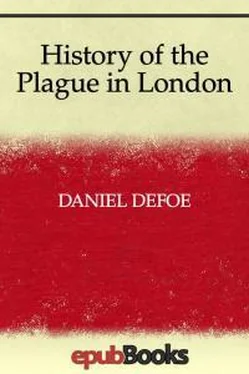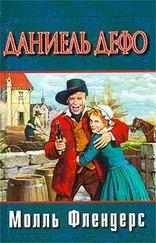Даниэль Дефо - History of the Plague in London
Здесь есть возможность читать онлайн «Даниэль Дефо - History of the Plague in London» весь текст электронной книги совершенно бесплатно (целиком полную версию без сокращений). В некоторых случаях можно слушать аудио, скачать через торрент в формате fb2 и присутствует краткое содержание. Год выпуска: 2014, Издательство: epubBooks Classics, Жанр: Историческая проза, на английском языке. Описание произведения, (предисловие) а так же отзывы посетителей доступны на портале библиотеки ЛибКат.
- Название:History of the Plague in London
- Автор:
- Издательство:epubBooks Classics
- Жанр:
- Год:2014
- ISBN:нет данных
- Рейтинг книги:4 / 5. Голосов: 1
-
Избранное:Добавить в избранное
- Отзывы:
-
Ваша оценка:
- 80
- 1
- 2
- 3
- 4
- 5
History of the Plague in London: краткое содержание, описание и аннотация
Предлагаем к чтению аннотацию, описание, краткое содержание или предисловие (зависит от того, что написал сам автор книги «History of the Plague in London»). Если вы не нашли необходимую информацию о книге — напишите в комментариях, мы постараемся отыскать её.
History of the Plague in London — читать онлайн бесплатно полную книгу (весь текст) целиком
Ниже представлен текст книги, разбитый по страницам. Система сохранения места последней прочитанной страницы, позволяет с удобством читать онлайн бесплатно книгу «History of the Plague in London», без необходимости каждый раз заново искать на чём Вы остановились. Поставьте закладку, и сможете в любой момент перейти на страницу, на которой закончили чтение.
Интервал:
Закладка:
This, however, is certain, not a man of them appeared for a great while in or about London. There were indeed several doctors who published bills recommending their several physical preparations for cleansing the body, as they call it, after the plague, and needful, as they said, for such people to take who had been visited and had been cured; whereas, I must own, I believe that it was the opinion of the most eminent physicians of that time, that the plague was itself a sufficient purge, and that those who escaped the infection needed no physic to cleanse their bodies of any other things (the running sores, the tumors, etc., which were broken and kept open by the direction of the physicians, having sufficiently cleansed them); and that all other distempers, and causes of distempers, were effectually carried off that way. And as the physicians gave this as their opinion wherever they came, the quacks got little business.
There were indeed several little hurries which happened after the decrease of the plague, and which, whether they were contrived to fright and disorder the people, as some imagined, I cannot say; but sometimes we were told the plague would return by such a time; and the famous Solomon Eagle, the naked Quaker I have mentioned, prophesied evil tidings every day, and several others, telling us that London had not been sufficiently scourged, and the sorer and severer strokes were yet behind. Had they stopped there, or had they descended to particulars, and told us that the city should be the next year destroyed by fire, then, indeed, when we had seen it come to pass, we should not have been to blame to have paid more than common respect to their prophetic spirits (at least, we should have wondered at them, and have been more serious in our inquiries after the meaning of it, and whence they had the foreknowledge); but as they generally told us of a relapse into the plague, we have had no concern since that about them. Yet by those frequent clamors we were all kept with some kind of apprehensions constantly upon us; and if any died suddenly, or if the spotted fevers at any time increased, we were presently alarmed; much more if the number of the plague increased, for to the end of the year there were always between two and three hundred [342] Supply "died."
of the plague. On any of these occasions, I say, we were alarmed anew.
Those who remember the city of London before the fire must remember that there was then no such place as that we now call Newgate Market; but in the middle of the street, which is now called Blow Bladder Street, and which had its name from the butchers, who used to kill and dress their sheep there (and who, it seems, had a custom to blow up their meat with pipes, to make it look thicker and fatter than it was, and were punished there for it by the lord mayor),—I say, from the end of the street towards Newgate there stood two long rows of shambles for the selling [343] Supply "of."
meat.
It was in those shambles that two persons falling down dead as they were buying meat, gave rise to a rumor that the meat was all infected; which though it might affright the people, and spoiled the market for two or three days, yet it appeared plainly afterwards that there was nothing of truth in the suggestion: but nobody can account for the possession of fear when it takes hold of the mind. However, it pleased God, by the continuing of the winter weather, so to restore the health of the city, that by February following we reckoned the distemper quite ceased, and then we were not easily frighted again.
There was still a question among the learned, and [344] Substitute "which."
at first perplexed the people a little; and that was, in what manner to purge the houses and goods where the plague had been, and how to render them [345] Those.
habitable again which had been left empty during the time of the plague. Abundance of perfumes and preparations were prescribed by physicians, some of one kind, some of another, in which the people who listened to them put themselves to a great, and indeed in my opinion to an unnecessary, expense; and the poorer people, who only set open their windows night and day, burnt brimstone, pitch, and gunpowder, and such things, in their rooms, did as well as the best; nay, the eager people who, as I said above, came home in haste and at all hazards, found little or no inconvenience in their houses, nor in their goods, and did little or nothing to them.
However, in general, prudent, cautious people did enter into some measures for airing and sweetening their houses, and burnt perfumes, incense, benjamin, [346] A corruption of "benzoin," a resinous juice obtained from a tree that flourishes in Siam and the Malay Archipelago. When heated, it gives off a pleasant odor. It is one of the ingredients used in court–plaster.
resin, and sulphur in their rooms, close shut up, and then let the air carry it all out with a blast of gunpowder; others caused large fires to be made all day and all night for several days and nights. By the same token that [347] This word should be omitted.
two or three were pleased to set their houses on fire, and so effectually sweetened them by burning them down to the ground (as particularly one at Ratcliff, one in Holborn, and one at Westminster, besides two or three that were set on fire; but the fire was happily got out again before it went far enough to burn down the houses); and one citizen's servant, I think it was in Thames Street, carried so much gunpowder into his master's house, for clearing it of the infection, and managed it so foolishly, that he blew up part of the roof of the house. But the time was not fully come that the city was to be purged with fire, nor was it far off; for within nine months more I saw it all lying in ashes, when, as some of our quaking philosophers pretend, the seeds of the plague were entirely destroyed, and not before,—a notion too ridiculous to speak of here, since, had the seeds of the plague remained in the houses, not to be destroyed but by fire, how has it been that they have not since broken out, seeing all those buildings in the suburbs and liberties, all in the great parishes of Stepney, Whitechapel, Aldgate, Bishopsgate, Shoreditch, Cripplegate, and St. Giles's, where the fire never came, and where the plague raced with the greatest violence, remain still in the same condition they were in before?
But to leave these things just as I found them, it was certain that those people who were more than ordinarily cautious of their health did take particular directions for what they called seasoning of their houses; and abundance of costly things were consumed on that account, which I cannot but say not only seasoned those houses as they desired, but filled the air with very grateful and wholesome smells, which others had the share of the benefit of, as well as those who were at the expenses of them.
Though the poor came to town very precipitantly, as I have said, yet, I must say, the rich made no such haste. The men of business, indeed, came up, but many of them did not bring their families to town till the spring came on, and that they saw reason to depend upon it that the plague would not return.
The court, indeed, came up soon after Christmas; but the nobility and gentry, except such as depended upon and had employment under the administration, did not come so soon.
I should have taken notice here, that notwithstanding the violence of the plague in London and other places, yet it was very observable that it was never on board the fleet; and yet for some time there was a strange press [348] The "press gang" was a naval detachment under the command of an officer, empowered to seize men and carry them off for service on men–of–war.
in the river, and even in the streets, for seamen to man the fleet. But it was in the beginning of the year, when the plague was scarce begun, and not at all come down to that part of the city where they usually press for seamen; and though a war with the Dutch was not at all grateful to the people at that time, and the seamen went with a kind of reluctancy into the service, and many complained of being dragged into it by force, yet it proved, in the event, a happy violence to several of them, who had probably perished in the general calamity, and who, after the summer service was over, though they had cause to lament the desolation of their families (who, when they came back, were many of them in their graves), yet they had room to be thankful that they were carried out of the reach of it, though so much against their wills. We, indeed, had a hot war with the Dutch that year, and one very great engagement [349] Off Lowestoft, in 1665. Though the Dutch were beaten, they made good their retreat, and heavily defeated the English the next year in the battle of The Downs.
at sea, in which the Dutch were worsted; but we lost a great many men and some ships. But, as I observed, the plague was not in the fleet; and when they came to lay up the ships in the river, the violent part of it began to abate.
Интервал:
Закладка:
Похожие книги на «History of the Plague in London»
Представляем Вашему вниманию похожие книги на «History of the Plague in London» списком для выбора. Мы отобрали схожую по названию и смыслу литературу в надежде предоставить читателям больше вариантов отыскать новые, интересные, ещё непрочитанные произведения.
Обсуждение, отзывы о книге «History of the Plague in London» и просто собственные мнения читателей. Оставьте ваши комментарии, напишите, что Вы думаете о произведении, его смысле или главных героях. Укажите что конкретно понравилось, а что нет, и почему Вы так считаете.












